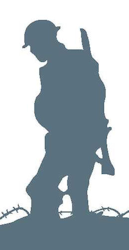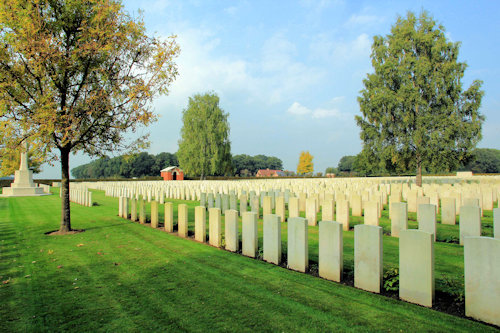Name
Horace Alfred Wood (MM)
Conflict
First World War
Date of Death / Age
25/10/1917
27
Rank, Service Number & Service Details
Private
13216
Bedfordshire Regiment
7th Bn.
Awards: Service Medals/Honour Awards
Not Yet Researched
Military Medal
Cemetery/Memorial: Name/Reference/Country
DOZINGHEM MILITARY CEMETERY
X. D. 10.
Belgium
Headstone Inscription
N/A
UK & Other Memorials
Rickmansworth UDC memorial,
St Peter's Church Roll of Honour, Mill End,
St. Peter's C & E Primary School Memorial, Mill End
Pre War
Horace Alfred Wood was born in 1890, the eldest child of Frederick and Rose Wood who lived at Church Street Cottages, Mill End, Rickmansworth.
The 1891 census shows that Frederick was a journeyman tailor, originally from Kent and his mother, Rose, was from St Pancras, London. In 1901 Horace was living with his uncle Alfred Peddle and his aunt Mary at Uxbridge Road in Mill End. In 1911 he was still living with Alfred Peddle at Laurel Villas, Uxbridge Road but his parents, with their younger daughter and 3 younger sons, were living next door. Horace attended St Peter’s School in Mill End and in 1911 was working as a carpenter.
Wartime Service
He enlisted at Marylebone and entered France on 2 Feb 1915.
The Battle of Passchendaele, also known as the Third Battle of Ypres took place between July and November 1917 for control of the ridges south and east of Ypres. The week before Horace Wood died, the 7th Battalion were at Tunnellers Camp and the time was spent resting and refitting in anticipation of proceeding up the line again.
On the 24th October they went to Canal Bank and marched to the Lane Trench where they were given rations for a 48 hour tour in the trenches and in the evening they relieved the Royal Fusiliers. The War Diaries report that there was a great deal of shelling but the Battalion held the line. They were relieved on the 26th. There is no mention of casualties so it is possible that Private Wood was injured earlier. In preparation for the Battle of Ypres (Ieper), the British Army had set up a number of field hospitals behind the line. Three such hospitals were set up near Dozinghem and soldiers who died of their wounds were buried there.
Horace received the Military Medal which was a decoration given to soldiers below commissioned rank for bravery in battle on land.
Additional Information
His effects of £21 5s 7d were left to his father, Frederick along with a War gratuity of £14.
Acknowledgments
Pat Hamilton
Malcolm Lennox, Paul Johnson



